OpenAI has officially launched Sora, its groundbreaking AI video generator, for public use in the United States. This announcement marks a significant step in making advanced text-to-video technology accessible to a broader audience.
Sora: Transforming Text into Video
Sora enables users to create video clips by simply providing written prompts. For example, OpenAI’s website demonstrates the prompt “a wide, serene shot of a family of woolly mammoths in an open desert”, which generates a realistic video of mammoths strolling through sand dunes.
According to OpenAI, this early version aims to inspire creativity and expand possibilities in video storytelling. “We hope this early version of Sora will enable people everywhere to explore new forms of creativity, tell their stories, and push the boundaries of what’s possible with video storytelling,” the company stated in a blog post.
From Testing to Public Access
Initially launched in February, Sora was accessible only to select artists, filmmakers, and safety testers. The public release was accompanied by heavy demand, with OpenAI’s website experiencing sign-up issues due to high traffic.
Tech reviewer Marques Brownlee, who previewed the tool, described the results as both “horrifying and inspiring.” While Sora excelled at generating landscapes and stylistic effects, it struggled with realistic physics and produced some visual defects.
OpenAI’s Expanding AI Ecosystem
Best known for ChatGPT, OpenAI has rapidly diversified its portfolio of generative AI tools. These include the voice-cloning feature and the integration of the DALL-E image generator into ChatGPT. Backed by Microsoft, OpenAI leads the AI market with a valuation nearing $160 billion.
However, the journey to Sora’s release hasn’t been without challenges. The tool faced suspension after a group of artists exploited a backdoor to gain unauthorized access, accusing OpenAI of undermining creative livelihoods.
Limitations and Compliance
OpenAI clarified that it is still working to meet compliance requirements under the UK’s Online Safety Act, the EU’s Digital Services Act, and GDPR. For now, Sora will not be available in the UK or Europe.
Additionally, OpenAI is implementing strict content moderation, blocking explicit material and harmful content, such as deepfakes or child exploitation materials. Users must subscribe to OpenAI’s paid tools to access Sora.
Concerns Over Generative AI Misuse
While generative AI has evolved significantly, it still has limitations, including inaccuracies and the risk of misuse. Critics caution that tools like Sora could be exploited for disinformation or deepfake scams.
Conclusion
Sora’s public launch represents a major leap for AI video generation, opening up new creative possibilities while also sparking debates around its ethical use. OpenAI continues to refine its technologies while addressing compliance and safety concerns, ensuring Sora serves as a tool for innovation rather than harm.








Leave a Reply